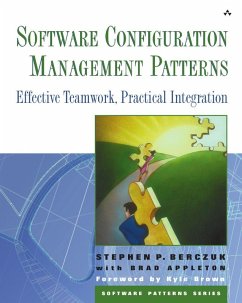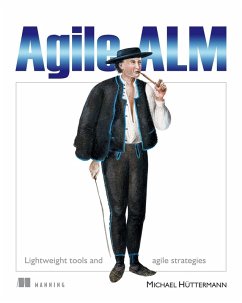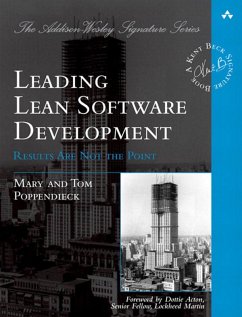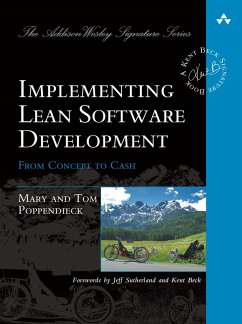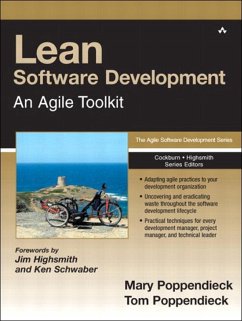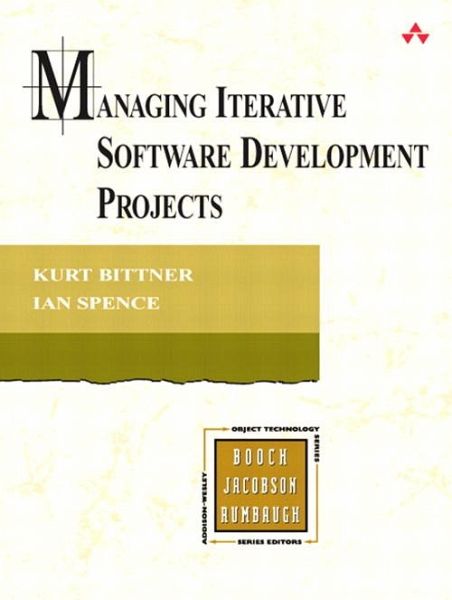
Managing Iterative Software Development Projects (eBook, ePUB)

PAYBACK Punkte
17 °P sammeln!
The Practical, Start-to-Finish Guide to Planning and Leading Iterative Software ProjectsIterative processes have gained widespread acceptance because they help software developers reduce risk and cost, manage change, improve productivity, and deliver more effective, timely solutions. But conventional project management techniques don't work well in iterative projects, and newer iterative management techniques have been poorly documented. Managing Iterative Software Development Projects is the solution: a relentlessly practical guide to planning, organizing, estimating, staffing, and managing a...
The Practical, Start-to-Finish Guide to Planning and Leading Iterative Software Projects
Iterative processes have gained widespread acceptance because they help software developers reduce risk and cost, manage change, improve productivity, and deliver more effective, timely solutions. But conventional project management techniques don't work well in iterative projects, and newer iterative management techniques have been poorly documented. Managing Iterative Software Development Projects is the solution: a relentlessly practical guide to planning, organizing, estimating, staffing, and managing any iterative project, from start to finish.
Leading iterative development experts Kurt Bittner and Ian Spence introduce a proven, scalable approach that improves both agility and control at the same time, satisfying the needs of developers, managers, and the business alike. Their techniques are easy to understand, and easy to use with any iterative methodology, from Rational Unified Process to Extreme Programming to the Microsoft Solutions Framework.
Whatever your role-team leader, program manager, project manager, developer, sponsor, or user representative-this book will help you
Whether you are interested in software development using RUP, OpenUP, or other agile processes, this book will help you reduce the anxiety and cost associated with software improvement by providing an easy, non-intrusive path toward improved results-without overwhelming you and your team.
Iterative processes have gained widespread acceptance because they help software developers reduce risk and cost, manage change, improve productivity, and deliver more effective, timely solutions. But conventional project management techniques don't work well in iterative projects, and newer iterative management techniques have been poorly documented. Managing Iterative Software Development Projects is the solution: a relentlessly practical guide to planning, organizing, estimating, staffing, and managing any iterative project, from start to finish.
Leading iterative development experts Kurt Bittner and Ian Spence introduce a proven, scalable approach that improves both agility and control at the same time, satisfying the needs of developers, managers, and the business alike. Their techniques are easy to understand, and easy to use with any iterative methodology, from Rational Unified Process to Extreme Programming to the Microsoft Solutions Framework.
Whatever your role-team leader, program manager, project manager, developer, sponsor, or user representative-this book will help you
- Understand the key drivers of success in iterative projects
- Leverage "time boxing" to define project lifecycles and measure results
- Use Unified Process phases to facilitate controlled iterative development
- Master core concepts of iterative project management, including layering and evolution
- Create project roadmaps, including release plans
- Discover key patterns of risk management, estimation, organization, and iteration planning
- Understand what must be controlled centrally, and what you can safely delegate
- Transition smoothly to iterative processes
- Scale iterative project management from the smallest to the largest projects
- Align software investments with the needs of the business
Whether you are interested in software development using RUP, OpenUP, or other agile processes, this book will help you reduce the anxiety and cost associated with software improvement by providing an easy, non-intrusive path toward improved results-without overwhelming you and your team.
Dieser Download kann aus rechtlichen Gründen nur mit Rechnungsadresse in A, B, BG, CY, CZ, D, DK, EW, E, FIN, F, GR, HR, H, IRL, I, LT, L, LR, M, NL, PL, P, R, S, SLO, SK ausgeliefert werden.




